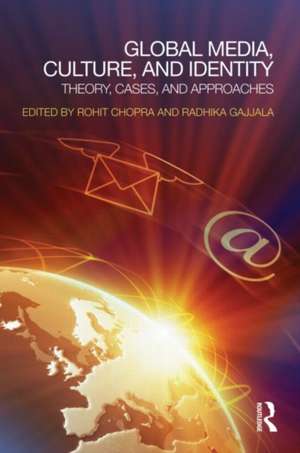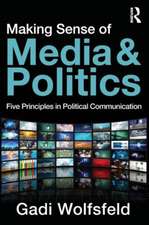Global Media, Culture, and Identity: Theory, Cases, and Approaches
Editat de Rohit Chopra, Radhika Gajjalaen Limba Engleză Paperback – 22 apr 2011
Some of the key questions and themes that the international contributors explore within the text include: Is the global audience of global television the same as the global audience of the internet? Can we conceptualize the global culture-media-identity dynamic beyond the discourse of postcolonialism? How does the globalization of media affect feelings of nationalism? How is the growth of a consumer "global middle class" spread, and resisted, through media? Global Media, Identity, and Culture takes a comparative media approach to addressing these, and other, issues across media forms including print, television, film, and new media
| Toate formatele și edițiile | Preț | Express |
|---|---|---|
| Paperback (1) | 419.33 lei 6-8 săpt. | |
| Taylor & Francis – 22 apr 2011 | 419.33 lei 6-8 săpt. | |
| Hardback (1) | 1003.43 lei 6-8 săpt. | |
| Taylor & Francis – 22 apr 2011 | 1003.43 lei 6-8 săpt. |
Preț: 419.33 lei
Nou
Puncte Express: 629
Preț estimativ în valută:
80.25€ • 83.47$ • 66.25£
80.25€ • 83.47$ • 66.25£
Carte tipărită la comandă
Livrare economică 12-26 aprilie
Preluare comenzi: 021 569.72.76
Specificații
ISBN-13: 9780415877916
ISBN-10: 0415877911
Pagini: 280
Ilustrații: 7 halftones
Dimensiuni: 152 x 229 x 15 mm
Greutate: 0.38 kg
Ediția:New.
Editura: Taylor & Francis
Colecția Routledge
Locul publicării:Oxford, United Kingdom
ISBN-10: 0415877911
Pagini: 280
Ilustrații: 7 halftones
Dimensiuni: 152 x 229 x 15 mm
Greutate: 0.38 kg
Ediția:New.
Editura: Taylor & Francis
Colecția Routledge
Locul publicării:Oxford, United Kingdom
Public țintă
Postgraduate and UndergraduateCuprins
Foreword Emile McAnany 1. Introduction: Media, Culture, and Identity in the Time of the Global Rohit Chopra I. Georgraphies and Currents of Global Media and Identity 2. Endemic Reporting: Calibrating the ‘News’ and ‘Normal Disease’ Cindy Patton 3. The Ethnoscape of Hip Wop: Alterity and Authenticity in Italian North American Hip Hop Joseph Sciorra 4. The Global Nomad: Navigating Mediated Space at a Global Scale Michael Jenson 5. Overseas Print Capitalism and Chinese Nationalism in the Early Twentieth Century David Kenley II. Entanglements of the Global, Regional, National, and Local 6. Reading the i-pill Advertisement: The Pleasures and Pressures of Contemporary Contraceptive Advertising in India Nayantara Sheoran 7. The Fetishistic Challenge: Things in Nineteenth Century Literature as Mediators of Identity Frederike Felcht 8. How Far to the Global? Producing Television at the Margins as Lived Experiences Ivan Kwek 9. Remediation and Scaling: The Making of ‘Global’ Identities Aalok Khandekar and Grant Jun Otsuki 10. A New Hollywood Genre? The Global-Local Film Nolwenn Mingant 11. The Discursive Disjunctions of Globalizing Media: Scalar Claims and Tensions at the French-German and European Television Channel ARTE Damien Stankiewicz III. Digital Mediations in the Global Era 12. Towards a Global Digital History Paul Longley Arthur 13. Subtitling Jia Zhangke’s films: Intermediality, Digital Technology, and the Varieties of Foreignness in Global Cinema Hudson Moura 14. Women Seeking Women: Identity Constructions in German and Taiwanese Online Personal Ads Matthew Heinz and Hsin-I Cheng 15. Marketing Empowerment? Commodifying the ‘Other’ through Online Microfinance Radhika Gajjala, Anca Birzescu, and Franklin N. A. Yartey Afterword Media Identities in a ‘Post-American’ World Daya Thussu
Notă biografică
Rohit Chopra is Assistant Professor of Communication at Santa Clara University. He is author of Technology and Nationalism in India: Cultural Negotiations from Colonialism to Cyberspace (New York: Cambria Press, 2008).
Radhika Gajjala is Associate Professor and Graduate Coordinator of Communication Studies at Bowling Green State University. She is author of Cyber Selves: Feminist Ethnographies of South Asian Women (Altamira Press, 2004) and co-editor of South Asian Technospaces (Peter Lang, 2008).
Radhika Gajjala is Associate Professor and Graduate Coordinator of Communication Studies at Bowling Green State University. She is author of Cyber Selves: Feminist Ethnographies of South Asian Women (Altamira Press, 2004) and co-editor of South Asian Technospaces (Peter Lang, 2008).
Descriere
This edited volume examines the ways that global media shapes relations between place, culture, and identity. Through the included essays, Chopra and Gajjala offer a mix of theoretical reflections and empirical case studies that will help readers understand how the media can shape cultural identities and, conversely, how cultural formations can influence the political economy of global media. The interdisciplinary, international scholars gathered here push the discussion of what it means to do global media studies beyond uncritical celebrations of global media technologies (or globalization) as well as beyond perspectives that are a priori dismissive of the possibilities of global media.
Some of the key questions and themes that the contributors explore within the text include: Is the global audience of global television the same as the global audience of the internet? Can we conceptualize the global culture-media-identity dynamic beyond the discourse of postcolonialism? How does the globalization of media affect feelings of nationalism? How is the growth of a consumer "global middle class" spread, and resisted, through media? Global Media, Identity, and Culture takes a comparative media approach to addressing these, and other, issues across media forms including print, television, film, and new media.
Some of the key questions and themes that the contributors explore within the text include: Is the global audience of global television the same as the global audience of the internet? Can we conceptualize the global culture-media-identity dynamic beyond the discourse of postcolonialism? How does the globalization of media affect feelings of nationalism? How is the growth of a consumer "global middle class" spread, and resisted, through media? Global Media, Identity, and Culture takes a comparative media approach to addressing these, and other, issues across media forms including print, television, film, and new media.











